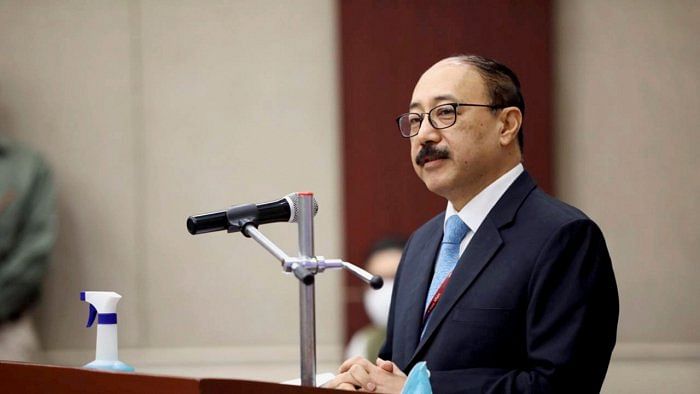
India presided over a United Nations Security Council meeting, which ended with adoption of a resolution on Monday – taking the international community closer to recognising the Taliban as a state actor in control in Afghanistan.
New Delhi joined the majority of the Security Council to reconcile with the new reality in Kabul, pinning its hope on the Taliban’s promise that it would not allow terrorists to launch attacks against any other country from the territory of Afghanistan.
As the last few United States troops boarded a military aircraft at the Hamid Karzai International Airport in Kabul and brought to an end its 20-year-long war in Afghanistan, the Security Council had a meeting at the UN headquarters in New York on Monday (early on Tuesday, according to Indian Standard Time) and adopted a resolution, calling upon the Taliban to adhere to its August 27 promise and allow Afghans and foreign nationals desiring to leave Afghanistan to do so in “safe, secure and orderly manner”. It stressed on combating terrorism in Afghanistan and took note of the “relevant commitments” made by the Taliban.
Also Read — Under India's Presidency, UNSC adopts strong resolution on Afghanistan, China, Russia abstain
The UNSC adopted the resolution a fortnight after the Taliban militants took over Kabul on August 15, culminating its blitz across Afghanistan.
Foreign Secretary Harsh Shringla chaired the UNSC session, which took place just a day before India’s month-long term as the president of the council came to its end on Tuesday. The resolution was moved by France, the United Kingdom and the United States. India and nine other non-permanent members supported it. Russia and China abstained from voting on the resolution.
“The resolution highlighted the will of the council (UNSC) to take necessary steps that are very important for the international community in its engagement with Afghanistan,” Shringla later told journalists at the UN headquarters in New York. He did not directly refer to the Taliban, but pointed it out that the resolution stressed on combatting terrorism in Afghanistan, particularly denying sanctuaries and support to the individuals and entities placed under the UNSC sanctions.
He specifically referred to the Lashkar-e-Taiba (LeT) and the Jaish-e-Mohammad (JeM) and tacitly indicated that New Delhi would expect the Taliban to sever its links with the anti-India terrorist organisations based in Pakistan.
“The UNSC resolution almost treats the Taliban de facto as a ‘state actor' and the irony is that it happened under India's watch,” said New Delhi's former envoy to Kabul, Gautam Mukhopadhaya, adding: "So, what's next now?”
Linda Thomas-Greenfield, the US envoy to the UN, however, said that President Joe Biden’s administration in Washington D.C. or the Security Council had not yet recognised the Taliban. “They haven’t even formed a government yet. So, we need to see what kind of government they form. We insist that that government be inclusive, and that it allows for the participation of women, and that it takes into consideration, as it forms itself, the rights of all Afghans, including minorities,” she told journalists in New York, adding: “So, we will see what kinds of actions they take before any decisions are made about recognition.”
To ensure that China and Russia do not veto it, the UNSC resolution avoided any tough word on Taliban or any condemnation for its military blitz across Afghanistan, leading to the fall of the President Ashraf Ghani’s government. Russia and China finally abstained, pointing out that the resolution did not specifically denounce Islamic State and East Turkestan Islamic Movement and failed to acknowledge the adverse impact of mass evacuation of Afghans and the move to suspend Afghanistan’s access to resources of the International Monetary Fund.
Also Read — India holds talks with Taliban; raises concern that Afghan soil should not be used against India
New Delhi has been concerned over the possibility of the Taliban’s return to power in Afghanistan giving Pakistan a strategic edge against India. Prime Minister Narendra Modi’s government, however, reached out to a sections of the Taliban and signalled that it might consider recognising a new regime in Kabul led by or with participation of the Taliban, if it was an “inclusive dispensation” with representation of women, minorities and all communities of Afghanistan and if it promised not to allow export of terror to other countries.
Deccan Herald is on WhatsApp Channels| Join now for Breaking News & Editor's Picks
